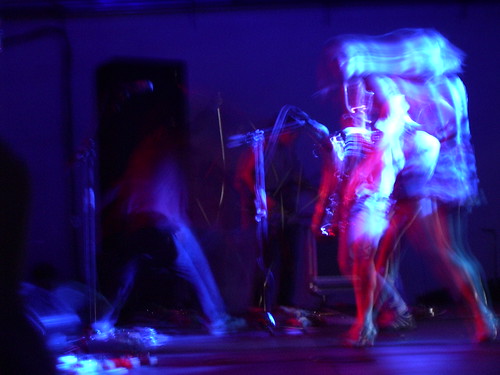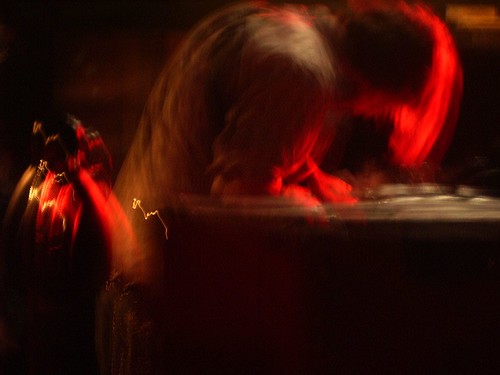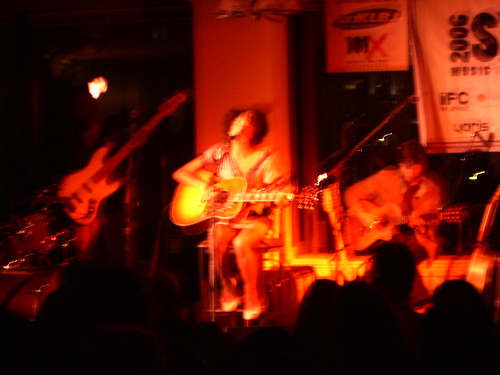
“It’s such a thin line between stupid and clever…”
- David St Hubbins, This Is Spinal Tap
Interior: A typical Major Label launch party, a coterie of industry leeches and vacant-eyed rock ‘stars’ milling and mingling aimlessly. In one particular corner, the guests of honour have just been informed that the proposed sleeve for their new album is too contentious for release. On discovering that its image, a tethered and greased naked woman on all fours with a black glove shoved in her face, offends the gender politics-conscious 1980s, Spinal Tap’s shit-hot guitarist Nigel Tufnell asks, innocently, “What’s wrong with being sexy?”
“Sex-ist,” corrects manager Ian Faith.
“-Ist,” explains lead singer David St Hubbins, helpfully. “More than sexy.”
It’s a testament to the genius of This Is Spinal Tap that this Mockumentary, if you will, remains choice tourbus viewing for all your favourite rock’n’roll bands, who view its excruciating comedy of Heavy Metal errors with a mixture of rueful recognition and laughter. Its set-pieces – bassist Derek Smalls’ deftly-placed cucumber, the dwarves-and-miniature-monuments pantomime of ‘
“Its other peoples’ egos that make them come up to us and say, ‘You’re doing me!’,” offers Christopher Guest, who played Tufnell, of the mythic misadventures, drawn from real-life experiences of Black Sabbath, Saxon and The Troggs, and the hapless rockers’ clueless wordplay, improvised by the actors themselves as the cameras whirred. Luckily for director Rob Reiner (who also played film-maker Marty DiBergi) his cast were all experienced improvisational actors; Guest in particular was fiendishly well-versed in the sights, the sounds, the smells of a hard-working rock band on the road.
As the raging 1960s gave way to the easy-going 1970s, rock’n’roll’s righteous fire extinguished by cocaine and country-rock, a new misunderstood generation looked elsewhere for their counter-cultural heroes. Forget the cliché of the 1990s alternative comedy scene – in pre-punk 1970s
Coolest of all these was a travelling comedic revue called Lemmings; financed by notorious humour magazine National Lampoon, this musical drama about a festival where the artists and attendees ritually offed themselves was a biting satire of the waning Woodstock generation, one of the first ‘punk’ cultural statements. Many of the Lemmings graduated to the National Lampoon Radio Hour, broadcast nationwide on whatever stations dared broadcast its riot of scabrous and violent satire, blowing rassberries at subjects like drugs, death and racism.
Lampoon discovered many of the decade’s comic superstars, like John Belushi, Bill Murray,
As the decade wore on, Lampoon’s star acts left for Saturday Night Live, taking Lampoon’s brutal humour revolution to television and commercial success; Guest, however, went on to write for comedienne Lily Tomlin and pursue less high-profile roles. He’d hooked up with McKean, a fellow High School of Arts and Music attendee, who was enjoying national fame as uber-nerd Lenny on TV’s Laverne & Shirley. McKean and his onscreen buddy David ‘Squiggy’ Lander recorded an album as Lenny & The Squigtones; on guitar was one ‘Nigel Tufnel’, Guest’s nom-du-rock.
The first true performance by Spinal Tap was in 1978, on offbeat music show The Midnight Special; backing a performance by arch folkie Loudon Wainwright III, Guest, McKean and friend Harry Shearer – a wizard comedic improviser with a reputation for awkwardness on set – fell afoul of a malfunctioning dry-ice machine which dripped hot oil on their faces. To take their minds off this ignominy, they improvised with each other in the roles of hapless rock musicians at the mercy of their props; from this minor disaster, a major comic creation was born.
“You’ve never seen blanker stares on the faces of studio executives than when we’d show them our demo-reel,” remembers Guest of This Is Spinal Tap’s unpromising early days. Collaborating with director Rob Reiner, who’d made his name on legendary
Reiner and the band proceeded to shoot a masterpiece on the tightest of budgets, charting the heart-breaking decline of legendary rockers Spinal Tap as they tour their latest album, Smell The Glove, across
“It's obviously inherently funnier to have someone who isn't doing something very well,” explained Guest, later. “That is the basis of most comedy.” In another interview, he admitted an affectionate obsession in human behaviour, adding “I like to sit in the park and watch people.” The observational humour was as spot-on as the parody rock songs (including ‘Big Bottom’, later covered by Soundgarden), Spinal Tap bumbling innocents ignorantly blissful of their diminishing place in the eternal playground that is rock’n’roll.
Hilarious and poignant as Spinal Tap was, it’s Box Office appeal was, initially, decidedly selective: This Is Spinal Tap found its true audience through late night TV screenings and videos, becoming, in the words of UK Tap-ripoffs Bad News, a massive cult. “We didn’t make any money off Spinal Tap, who would ask us to make a sequel?” says Michael McKean today, although the band reunited in 1992 for Breaks Like The Wind, a proto-Darkness comeback album, and tour from time to time.
After modest Hollywood success, Guest – improbably now a member of our House Of Lords after the death of his father, Lord Haden-Guest, and married to actress Jamie-Lee Curtis – returned to the mockumentary form in the mid-90s, with Waiting For Guffman, a brilliant and touching tale of amateur dramatics; Guest took the role of flamboyant professional director Corky StClair, trying to bring a touch of Broadway magic to a small American Midwestern town. For the movie, a cult classic, Guest assembled a fine cast of improvisational actors – Eugene Levy, Catherine O’Hara, Parker Posey and the hilarious Fred Willard (who cameo’d in This Is Spinal Tap, and would return for 2000’s Best In Show).
Guest brought his keen eye for the comedy of bizarre obsession to the world of high class dog breeding for this picture, even bringing Tap co-star McKean aboard; as with the previous pictures, the improvisational style meant the actors could deliver deliciously detailed and well-rounded characterisations, highlights including Parker Posey’s hyper-stressed yuppie, Levy and O’Hara’s henpecked husband and wife-with-a-steamy-past, and Guest’s lonely bloodhound owner, not to mention Willard as a wickedly inappropriate TV commentator.
Guest and his troupe’s latest picture, A Mighty Wind, does for folk-music what Spinal Tap did to Heavy Metal. “The Folksmen pre-existed 20 years ago,” reveals Guest of the folk-trio he, McKean and Shearer play in the movie. “We opened for Spinal Tap; we opened for ourselves!”
With their acidic improvised humour and stellar casts, these movies are as close as we’ll get to more magic from Spinal Tap (and Best In Show is, arguably, even funnier). Guest, McKean and Shearer have decided they’re too old to play their spandex-clad alter-egos; certainly This Is Spinal Tap sums up the manic, tragic microcosm of rock’n’roll so perfectly that the trio have little left to say on the subject. This movie is cranked all the way up to eleven, and you couldn’t possibly take it One Louder.
(c) Stevie Chick 2004



No comments:
Post a Comment